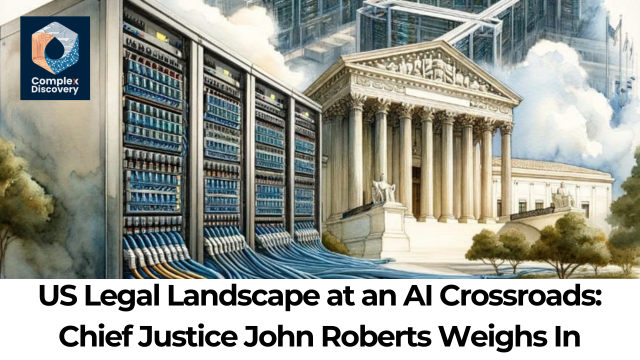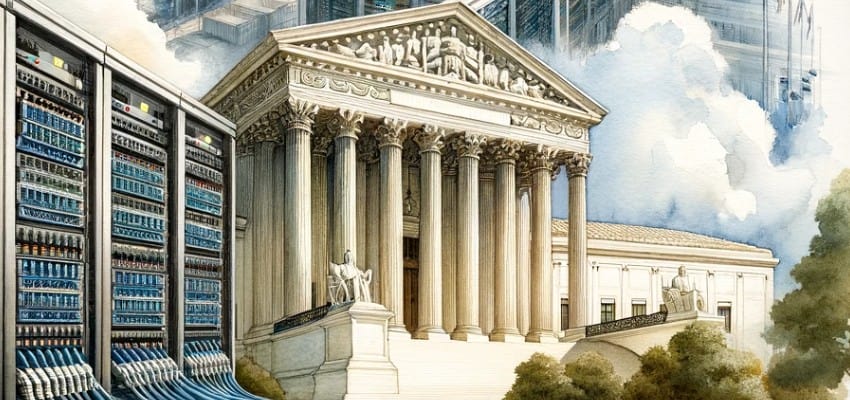
[EDRM Editor’s Note: This article was first published here on January 3, 2024 and EDRM is grateful to Rob Robinson, editor and managing director of ComplexDiscovery, for permission to republish.]

ComplexDiscovery Editor’s Note: As artificial intelligence enters the legal domain, Chief Justice Roberts offers an astute note of caution – while AI tools promise expanded access, wisdom necessitates gradual adoption and stringent governance. With human discernment irreplaceable, automation must bolster, not undermine, jurisprudence. Thus, the Chief Justice thoughtfully delineates principles that elevate prudence alongside progress, charting a careful course for AI assimilation. Law must embrace innovation but validate technologies against enduring virtues of equity and integrity. With regulators proposing oversight mechanisms, the legal profession has reached a crossroads. Measuring integration can expand justice’s promise without compromising its character by tempering change with time-honored ideals of reason and responsibility. The Chief Justice sets a vigilant, conservative tone for this new frontier.
In what seems to be an evolutionary leap in the U.S. legal system, Chief Justice of the Supreme Court, John Roberts, in his recent year-end report, highlighted the profound implications of Artificial Intelligence (AI) in the federal courts. The comprehensive report skewered any mention of Supreme Court ethics or the legal controversies embroiling former President Donald Trump, focusing instead on AI’s promising yet precarious frontier in law.
The report elaborates on AI’s capacity to democratize the courts, allowing folks with limited financial means a fair shake at justice. Yet, it asserts the irreplaceable value of the nuanced human judgment of judges, critical to the shades-of-grey decisions inherent in legal tussles, adeptly comparing AI’s role to that of optical technology in tennis – precise yet not attuned to complexities.
Rob Robinson, ComplexDiscovery.
In light of Roberts’ reflections, the legal field stands at the precipice of a paradigm shift. The integration of AI is seen not as a usurper of roles but as a significant influencer, particularly at the trial level. However, the Chief Justice’s prudent forecast leaves the doors open only a crack, ensuring AI’s role is catalytic, not cataclysmic.
Roberts underscored AI’s role as the “latest technological frontier” where its integration within the legal milieu presents potential benefits and significant pitfalls. In a cautious tone, devoid of hyperbolic enthusiasm prevalent in tech circles, he posited, “Any use of AI requires caution and humility.” He drilled down on cautionary tales of AI-generated counterfeit legal citations that punctured the integrity of official court records in recent cases, including one involving Michael Cohen, Trump’s lawyer.
The report elaborates on AI’s capacity to democratize the courts, allowing folks with limited financial means a fair shake at justice. Yet, it asserts the irreplaceable value of the nuanced human judgment of judges, critical to the shades-of-grey decisions inherent in legal tussles, adeptly comparing AI’s role to that of optical technology in tennis – precise yet not attuned to complexities.
In light of Roberts’ reflections, the legal field stands at the precipice of a paradigm shift. The integration of AI is seen not as a usurper of roles but as a significant influencer, particularly at the trial level. However, the Chief Justice’s prudent forecast leaves the doors open only a crack, ensuring AI’s role is catalytic, not cataclysmic.
Roberts avoided delving into ongoing legal dramas or ethical questions within The Supreme Court. Instead, his exposition advances a conversation on the judicial embrace of AI, emphasizing potential upsides tempered with an unwavering commitment to human oversight. This approach mirrors the prudent discourse necessitated by AI’s incremental infiltration into the law realm.
The report follows recent regulatory initiatives, such as the 5th U.S. Circuit Court of Appeals in New Orleans’ proposed rule, requiring attorneys to avoid AI-generated briefs or ensure human vetting of such content before submission. Such predictions mark a transitional period where The Supreme Court and lower courts are carefully crafting the framework for the future of AI-infused legal processes.
These advancements necessitate reevaluating how artificial intelligence technologies must be regulated within legal frameworks. Chief Justice Roberts’ sage discourse casts a delicate balance between embracing tech advancements and preserving the sanctity of manual reasoning within the judiciary, foreshadowing the tightrope the legal profession will navigate in the information age.
News Sources
- Chief Justice John Roberts Explores AI’s Role in Federal Courts in Year-End Report
- Artificial Intelligence Impact on Legal Landscape Raises Concerns, Warns Chief Justice Roberts
- The Supreme Court Warns as AI Reshapes The Legal Sector
Assisted by GAI and LLM Technologies per EDRM GAI and LLM Policy.
Additional Reading
- EU’s Artificial Intelligence Act: A Model for Responsible AI
- Exploring the Uptake of LLMs and Generative Artificial Intelligence in the eDiscovery Ecosystem
Source: ComplexDiscovery

Generative Artificial Intelligence and Large Language Model Use
ComplexDiscovery OÜ recognizes the value of GAI and LLM tools in streamlining content creation processes and enhancing the overall quality of its research, writing, and editing efforts. To this end, ComplexDiscovery OÜ regularly employs GAI tools, including ChatGPT, Claude 2, Midjourney, and DALL-E3, to assist, augment, and accelerate the development and publication of both new and revised content in posts and pages published (initiated in late 2022).
Read the ComplexDiscovery GAI and LLM Policy
ComplexDiscovery also provides a ChatGPT-powered AI article assistant for its users. This feature leverages LLM capabilities to generate relevant and valuable insights related to specific page and post content published on ComplexDiscovery.com. By offering this AI-driven service, ComplexDiscovery OÜ aims to create a more interactive and engaging experience for its users, while highlighting the importance of responsible and ethical use of GAI and LLM technologies.

